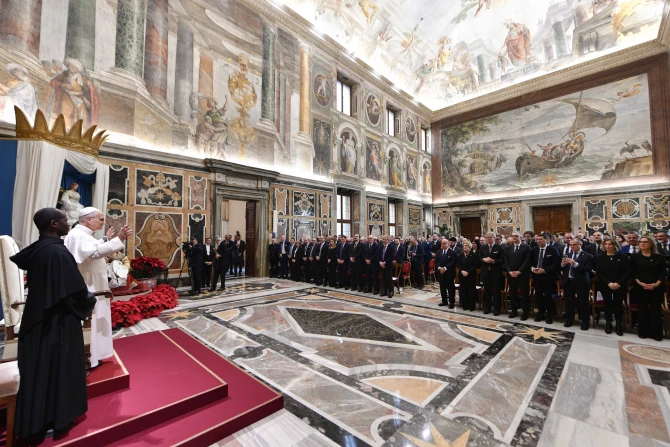The Vatican’s department for the interpretation of Church law has advised against publishing accusations damaging to someone’s reputation, such as abuse accusations, without legitimate and proportional reasons, especially if the person is deceased and therefore cannot defend his or her good name.
In a recently published letter, the Dicastery for Legislative Texts referenced Canon 220 of the Code of Canon Law, which prohibits slander and defamation, in arguing that “alleged reasons of transparency or reparation” or a “generic ‘right to information’” are not enough to justify the publication of unproven criminal allegations.
The letter to an unidentified monsignor responded to a question about “bona fama defuncti,” Latin for “good reputation of the deceased.” Dated Sept. 5, 2024, it was published on the dicastery’s website in a section with legal clarifications.
While the letter did not mention a specific crime or set of crimes, it did reference a statement of Pope Francis from a February 2019 Vatican meeting on the protection of minors from sexual abuse in the Church, that “it is necessary to prevent the publication of lists of the accused, even by dioceses, before the prior investigation and final conviction.”
It is a common practice of dioceses or independent abuse commissions to publish reports of credible accusations of sexual abuse listing the names of the accused priests and religious, including some who are deceased.
The dicastery disagreed with this approach, stating “the answer can only be negative with respect to the disclosability of hidden news concerning anyone, all the more so when it concerns deceased persons.”
The dicastery’s website said the letter does “not possess the formal value of an authentic interpretation” but answers individual questions about the application of canon law “deemed to be of general interest.”
The letter, signed by the dicastery’s prefect, Archbishop Filippo Iannone, OCarm, and secretary, Bishop Juan Ignacio Arrieta, said two highly-regarded canonical experts were consulted for the response.
Since Canon 220 of the Code of Canon law says “no one is permitted to harm illegitimately the good reputation which a person possesses,” the letter quoted, it means “in some cases the injury to good name may be legitimate, for example, to avoid any danger or threat to persons or the community.”
“Consequently,” it continued, “it would not be legitimate at all when such a risk is reasonably to be excluded, as in the case of alleged deceased criminals, where there can be neither legitimate nor proportionate reason for the injury to reputation.”
The Dicastery for Legislative Texts cited two principles of law: a person’s presumed innocence until judicially proven otherwise and “retroactivity,” which says someone cannot be convicted or charged for conduct that was not formally a crime at the time it was committed.
In the latter case, the letter said an example would be “so-called omissions of general duties of vigilance.”
The dicastery emphasized that these legal principles cannot be easily overridden to put in the public domain information, however credible, that would be to the “concrete detriment and existential harm of those personally affected, all the more so if it is inaccurate, or even unfounded or false, or completely useless such as that which concerns deceased persons.”
This article was originally published on Catholic News Agency.







